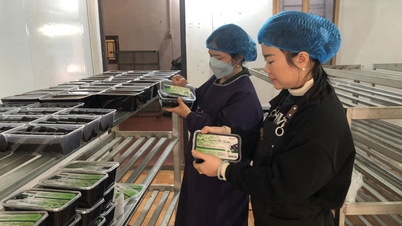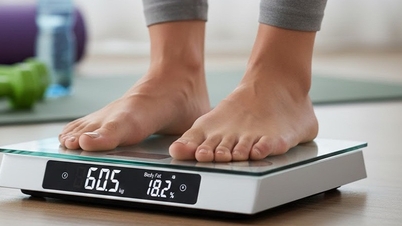Seafood, whole milk, and legumes contain many vitamins, minerals, and omega-3s that help balance hormones, slow down ovarian aging, and increase the ability to conceive.
Dr. Tran Thi Tra Phuong, Nutrihome Nutrition Clinic System, said that egg quality affects the chance of fertilization and implantation, and also determines the ability to maintain pregnancy. The higher the egg quality, the better the embryo quality, the higher the rate of successful pregnancy.
However, egg quality is not fixed and is easily affected by external factors. Age, toxic environmental factors, and lifestyle can cause egg quality to decline. Psychological factors such as stress, lack of sleep, imbalanced diet and hormones... also affect eggs.
According to Dr. Tra Phuong, building a reasonable diet plays an important role in reproductive health. Foods contain many nutrients such as iron, fiber, carbohydrates, unsaturated fats, animal protein, vegetable protein, vitamins and folic acid... They help stabilize hormones and blood circulation, enhance reproductive health, improve egg quality, and increase the ability to conceive.
Seafood, especially oily fish such as salmon, catfish, cod, tilapia... are rich in omega-3 unsaturated fatty acids, which help increase blood flow to the uterus, regulate reproductive hormones and menstrual cycles, fight inflammation, slow down the aging process of the ovaries, and increase egg quality. Oysters are also rich in zinc, which stimulates ovulation and fertility in women.
According to the US Food and Drug Administration (FDA), women who want to get pregnant should eat 300-350g of seafood per week... However, bottom-dwelling seafood should be limited because it contains a lot of heavy metals such as mercury.
Whole milk includes fresh milk, formula milk and dairy products such as cheese, cream, yogurt rich in animal protein, vitamins A, D, E, K and minerals calcium, zinc... beneficial in improving egg quality, stimulating natural ovulation, helping to increase the ability to conceive.
Legumes such as soybeans, lentils, winged beans, and black beans are rich sources of protein, fiber, and folate. Increasing consumption of these products helps balance hormones and stimulate early ovulation.

Healthy foods provide the nutrients needed for a healthy reproductive system. Photo: Freepik
Dark green leafy vegetables and ripe fruits such as spinach, water spinach, kale, kale, mustard greens, oranges, watermelons, and strawberries contain a lot of folic acid, vitamin C, and iron. These nutrients not only help nourish the eggs but also reduce the risk of neural tube defects in the fetus. Vitamin C acts as an antioxidant, has anti-inflammatory properties, and helps neutralize free radicals in the body - agents that damage egg cells.
Walnuts , macadamia nuts, cashews... are also useful because they are rich in fiber and omega-3.
According to Dr. Tra Phuong, women should combine appropriate physical exercise to relieve stress and maintain a reasonable weight. Being overweight, obese or thin all affect the ability to conceive. Fat tissue in obese people can block the fallopian tubes. If the body is underweight and weak, the eggs will not have enough nutrition to develop healthily, leading to a decline in quality.
Drinking plenty of water helps ensure the amount of fluid in the cervix, thereby making it easier for sperm to reach the egg, increasing the effectiveness of fertilization. Women should drink about two liters of water a day, limiting tea, caffeine, alcoholic beverages, and carbonated drinks.
Quitting smoking, getting enough sleep, and thoroughly examining and treating gynecological and reproductive diseases (if any) are also ways to ensure egg quality, increase the chance of conception, and avoid pregnancy complications.
Trinh Mai
Source link





![[Photo] National Assembly Chairman Tran Thanh Man attends the VinFuture 2025 Award Ceremony](/_next/image?url=https%3A%2F%2Fvphoto.vietnam.vn%2Fthumb%2F1200x675%2Fvietnam%2Fresource%2FIMAGE%2F2025%2F12%2F05%2F1764951162416_2628509768338816493-6995-jpg.webp&w=3840&q=75)

![[Photo] 60th Anniversary of the Founding of the Vietnam Association of Photographic Artists](/_next/image?url=https%3A%2F%2Fvphoto.vietnam.vn%2Fthumb%2F1200x675%2Fvietnam%2Fresource%2FIMAGE%2F2025%2F12%2F05%2F1764935864512_a1-bnd-0841-9740-jpg.webp&w=3840&q=75)





































































































Comment (0)